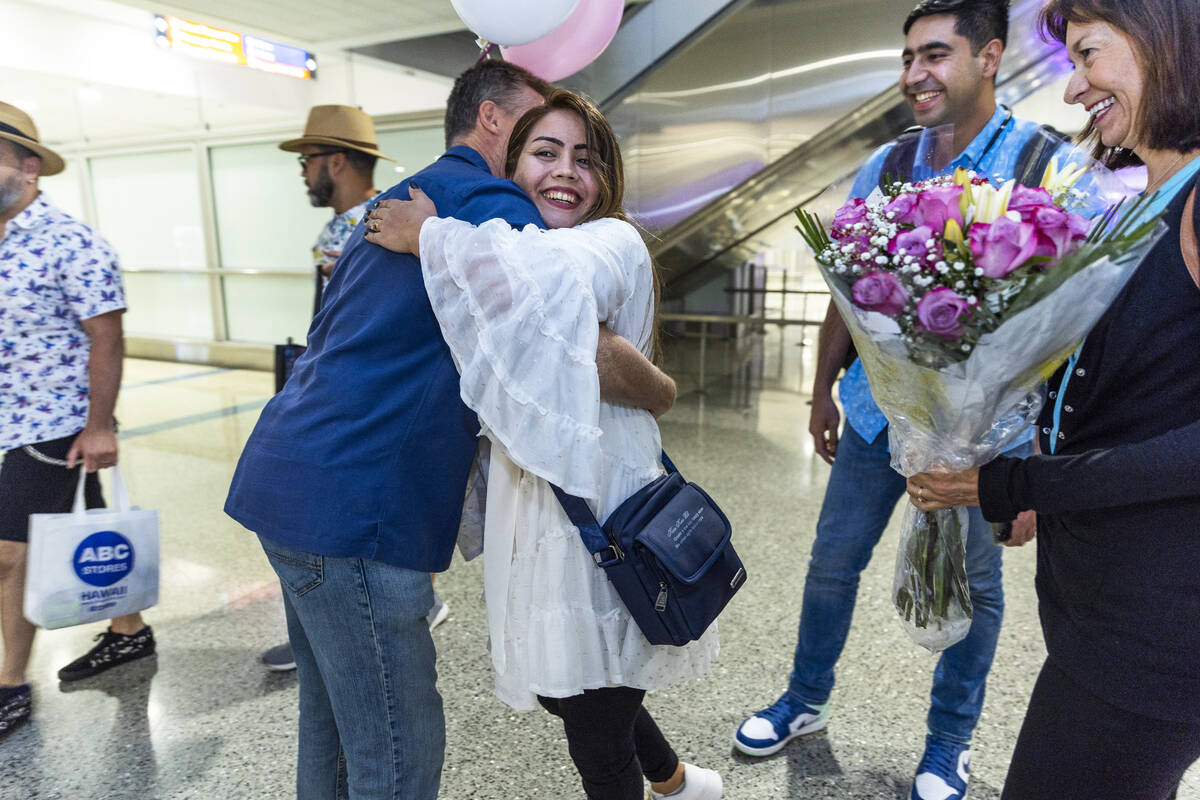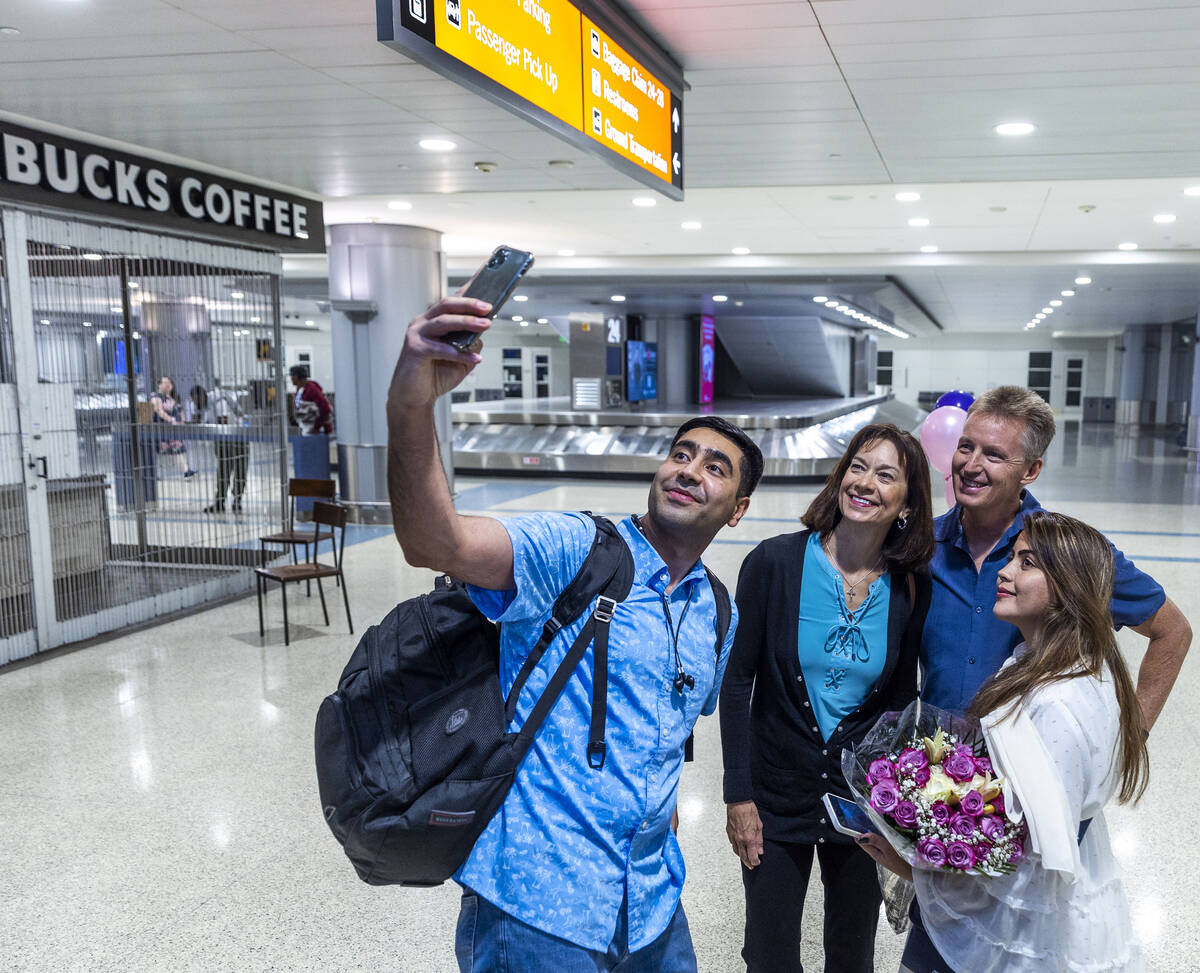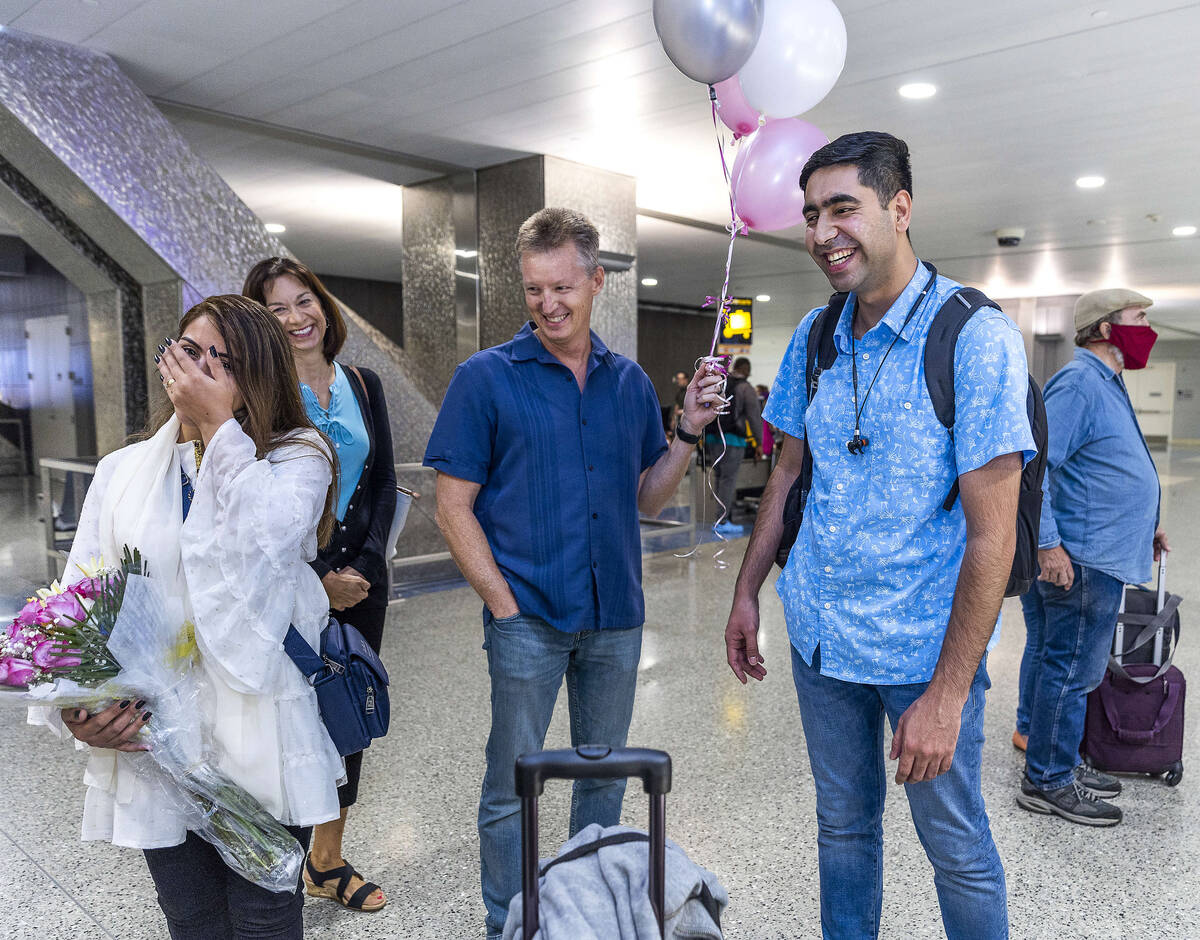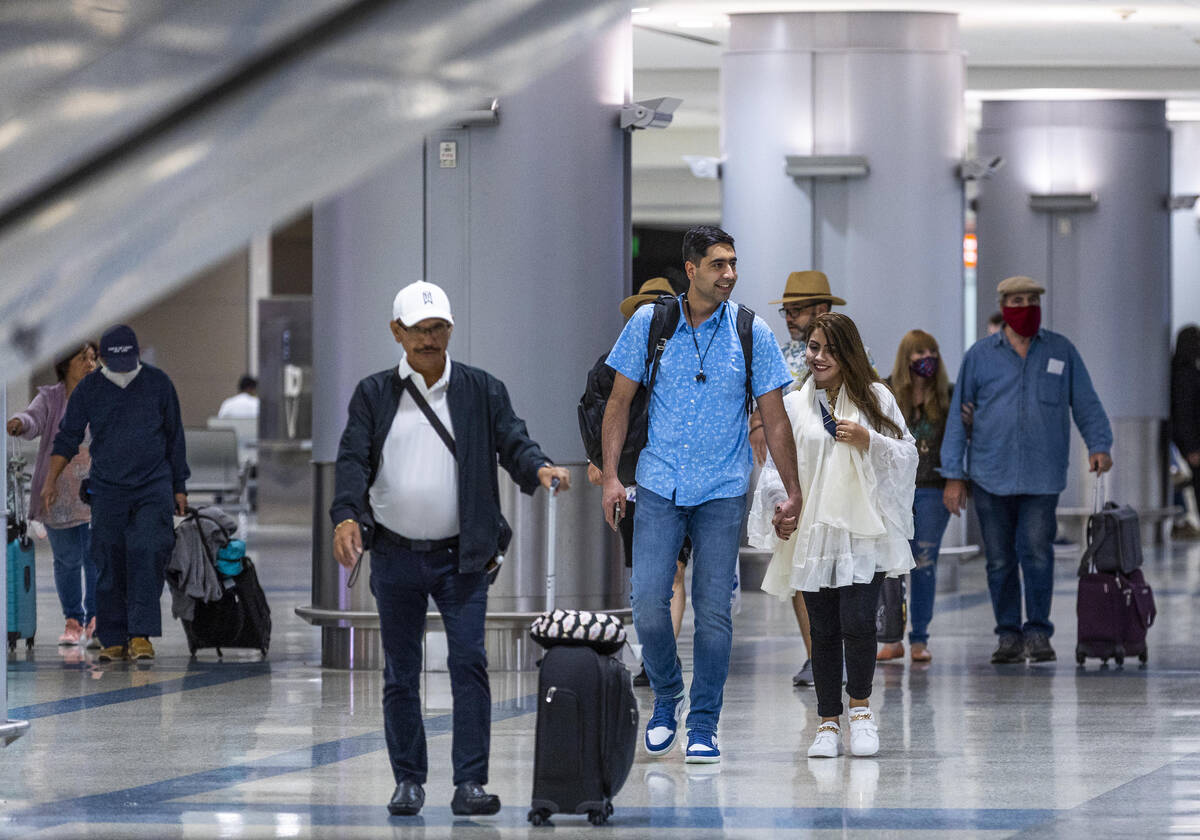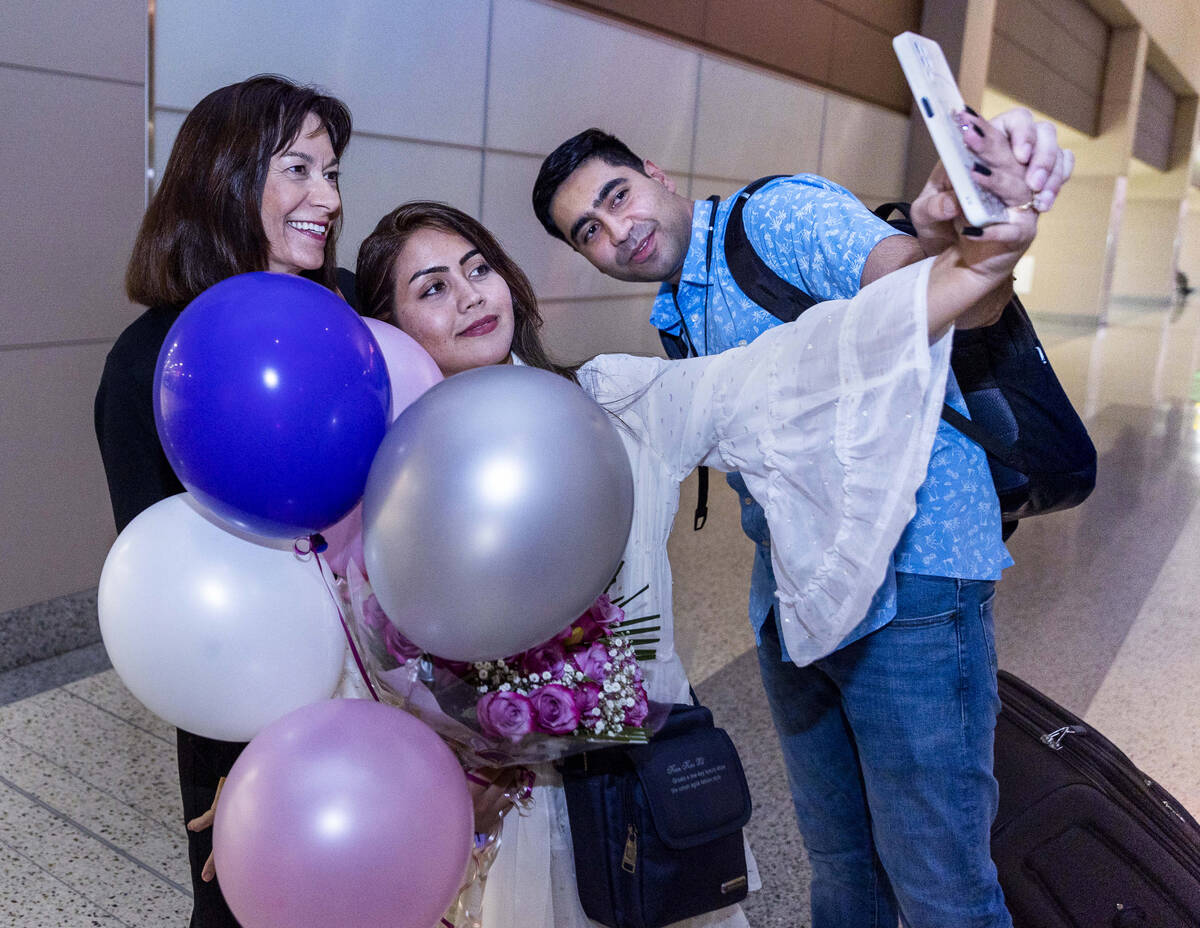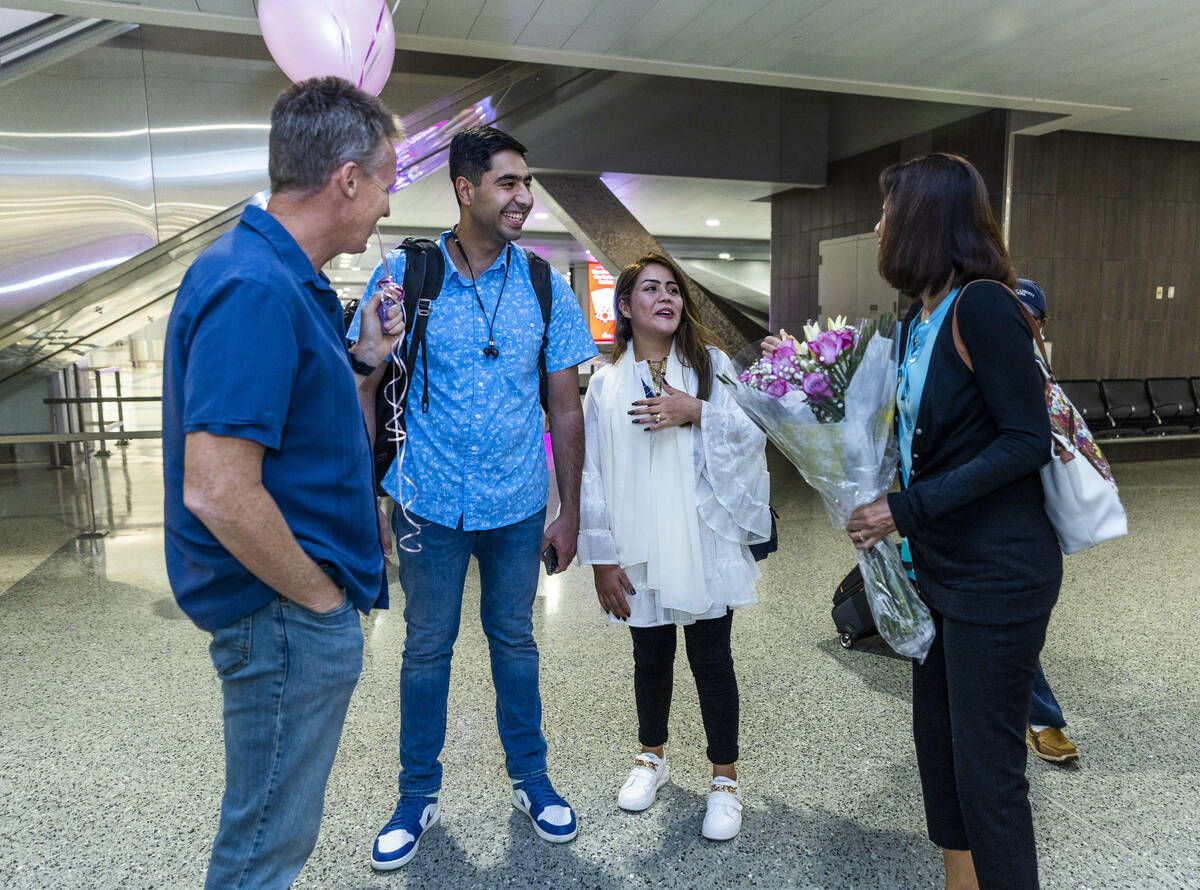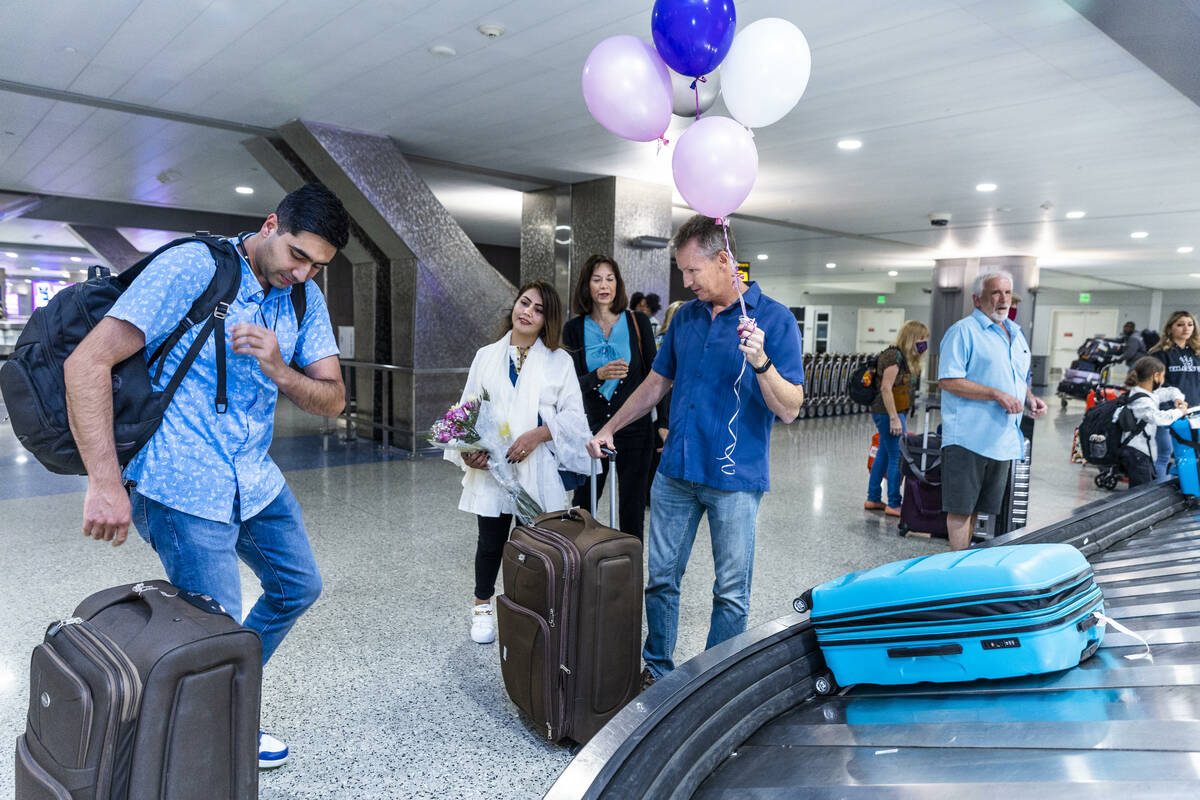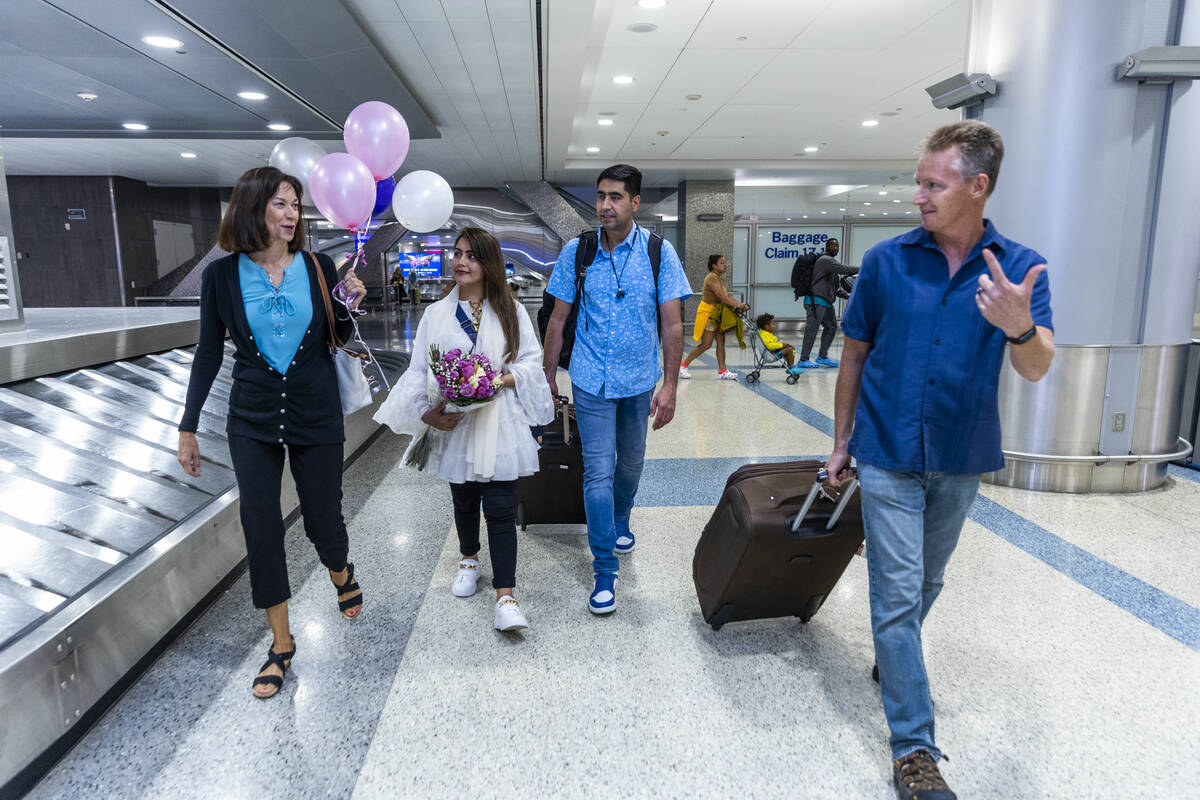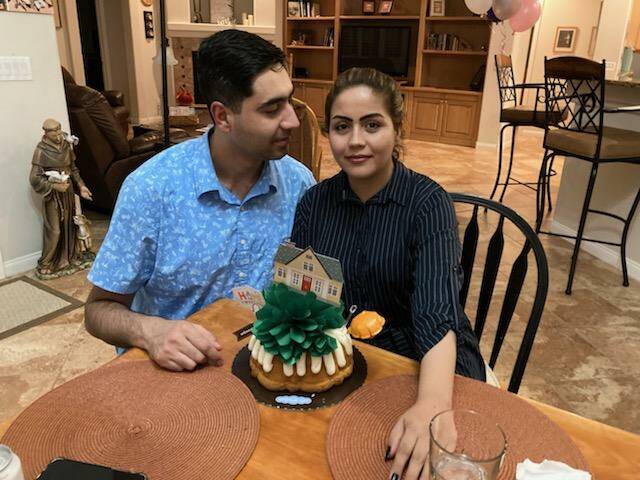After escaping the Taliban, would a young Afghan couple reunite in Las Vegas?
Editor’s note: This is the fourth in an occasional series of stories. The Review-Journal agreed not to use Shabana’s last name for the safety of family members still in Afghanistan. For more, visit lvrj.com/benny.
Shabana had a golden ticket that was about to be snatched away from her.
The young Afghan woman had won the so-called “green card lottery,” a coveted chance at a U.S. visa that would allow her to join her husband in Las Vegas. Mohammad “Benny” Shirzad had been evacuated roughly a year earlier from Kabul during the fall of Afghanistan to the Taliban.
Time was running out. Shabana, who was living with her in-laws in Kabul, had until the end of September to be interviewed for a visa at a U.S. embassy. However, there no longer was an embassy in Afghanistan.
In late June, she and her in-laws braved a dangerous journey by automobile into Pakistan. Although threatened at Taliban checkpoints, they safely crossed the border on temporary medical visas good for 60 days. But the family could neither secure visa extensions from the Pakistani government nor could they obtain an interview at the U.S. embassy.
Yet after an extraordinary series of events, Shabana would board a commercial airliner on Sept. 28 for her first-ever flight, which would transport her from Islamabad, Pakistan, to Istanbul, Turkey. Covered from head to toe except for her eyes, as required by the Taliban, she was without an escort for one of the few times in her life.
Before the plane lifted off, she removed her veil.
“I was very happy,” the 27-year-old recalled in an interview, with Shirzad, who speaks English fluently, translating for her.
“I knew that now I’m free.”
Escaping the Taliban
From Istanbul, Shabana was to fly to San Francisco to meet up with her husband before the final leg of her journey to Las Vegas. Shirzad was living in Henderson with the parents of the U.S. Air Force pilot who had flown him out of Kabul.
In August 2021, Shirzad, a flight attendant for an Afghan airline, had been assisting with evacuation flights out of Kabul for days nonstop before American soldiers told him and his crew they were in danger and to board a flight themselves.
During the flight, Shirzad, now 27, served as an impromptu translator for the pilot, Lt. Christopher Hoffman. When the Afghan found himself alone and penniless at a military base in New Jersey that served as a way station for evacuees, he contacted the pilot, who had given him his cellphone number.
The pilot’s parents, Henderson residents Scott and Ellen Hoffman, dismayed by the plight of U.S. allies in Afghanistan, helped Shirzad relocate to the Las Vegas area in time to spend Thanksgiving with their family. Then, for the next 10 months, they would try to help him reunite with his own.
Returning to Afghanistan for Shirzad and his family was unthinkable. After receiving repeated threats and once being shot at, Shirzad had left a job with a U.S. government contractor providing internet technology services to the U.S.-backed government installed after 9/11. As a teen, he’d been given the nickname “Benny” by U.S. soldiers in his village. His mother, who worked for U.S-affiliated aid organizations assisting Afghan women, also was threatened.
After Shirzad’s evacuation, armed members of the Taliban on two occasions searched the family’s apartment in Kabul where his parents and wife were staying. During one of the searches, the Taliban members were going to take with them a portrait of her husband that hung on the wall, but relented when Shabana begged them not to.
‘Heartbreaking conversation’
To assist them in navigating seemingly endless bureaucratic obstacles in the immigration process, the Hoffmans contacted the office of Nevada U.S. Sen. Catherine Cortez Masto. Her office opened a case for the family, meaning that it would take the lead in congressional efforts that were also taken up by the office of Nevada Sen. Jacky Rosen.
By late July, Shirzad and the Hoffmans were losing hope. They had a video chat with Shirzad’s wife and parents to tell them it seemed unlikely that the U.S. government would be able to help them before the expiration of their Pakistani visas and their expulsion from the country.
“It was a heart-breaking conversation and as an American, it is hard to understand the mentality, after all of the paperwork submitted, fees collected, how this family has not been granted a temporary visa to make their case to a judge for asylum,” Scott Hoffman wrote in an email to staff members for Cortez Masto and Rosen.
“Millions enter our country with far less evidence,” he wrote in the email dated July 24. A retired Air Force officer, Hoffman had served as a staff officer at U.S. Central Command, the administrative headquarters for military operations in the Afghanistan region.
That week, Shirzad had received his green card through the diversity immigrant visa program — known as the green card lottery — for individuals from countries with low immigration to the United States. Shirzad and his family also had applied for humanitarian parole, but the lottery route proved to be faster. As a couple, Shirzad and Shabana had won the lottery, placing them among the less than half of 1 percent of applicants who are randomly selected.
It was far from certain whether the couple would continue to be so lucky.
‘Can you help?’
In August, Gardnerville resident Jill Derby, a former Nevada university regent, got a call from Cortez Masto.
“Nevada’s a small state, and we all go way back,” said Derby, who chairs the board of trustees of The American University of Iraq, Sulaimani, in the country’s autonomous Kurdish region.
The senator asked, “Can you help, or do you know anybody who can?” Derby recalled.
Derby connected the senator with Vance Serchuk, a member of her board and a former senior adviser on national security and foreign affairs to the U.S. Senate Committee on Homeland Security.
Serchuk also serves on the board of the Afghan Future Fund, a nonprofit that formed after the fall of Kabul that assists with evacuation flights and provides other support for at-risk Afghans.
He was happy to help. Serchuk described as “painful and shameful” the knowledge that there are “so many people who were committed to America, who risked their lives for America, who put their lives on the line for the values and principles that we share, that were left behind.”
Through its contacts within the Pakistani government, the nonprofit worked to extend the family’s Pakistani visas through August of next year, he said.
“The processes around all of this are very complicated,” Serchuk said. “There’s a lot of bureaucracy. Things move very, very slowly. Unfortunately, it’s very, very difficult to navigate.”
The difficulties in navigation would continue. An interview for Shabana at the embassy in Islamabad couldn’t be scheduled before the completion of paperwork regarding her relocation to Pakistan from Afghanistan. The relocation paperwork couldn’t be completed before Shirzad’s own green card was approved.
With the Sept. 30 deadline looming, Scott Hoffman on Sept. 1 wrote to staff members for Cortez Masto and Rosen that Shabana was poised to lose her chance at a visa.
“This will be through no fault of her own, but a bureaucracy that we cannot seem to punch through,” he said.
Meanwhile, the senators’ offices were in contact with the State Department and U.S. Citizenship and Immigration Services, with Cortez Masto speaking directly to the immigration director, Ur Mendoza Jaddou, about the urgency of the case.
“Brave Afghans like Benny aided our troops and sought refuge in the U.S. after fleeing threats and violence from the Taliban,” Cortez Masto said in a statement emailed to the Review-Journal. “It was inconceivable that government red tape was keeping him and his wife apart, so I pushed the administration and made sure they could reunite.”
Rosen said in a statement that her office would continue to work with the State Department, immigration services and non-governmental organizations “to assist anyone in Nevada attempting to get family members and loved ones out of Afghanistan.”
‘Hustle, hustle, hustle’
By Sept. 19, an interview had been scheduled for Sept. 22 at the U.S. embassy in Islamabad. Shirzad, who works in IT services for a Las Vegas gaming company, contacted travel agencies to find an interpreter for his wife, who speaks only a few words of English. A required medical exam for Shabana was expedited. A driver was secured for the journey to the embassy in Islamabad from Peshawar, where the family was renting an apartment.
Then, the day before the scheduled interview, Shabana received a phone call that her appointment at the embassy had been canceled. No explanation was given. From Nevada, Shirzad contacted the embassy and was told no explanation would be provided.
Scott Hoffman again emailed the senators’ staff, seeking their intervention.
“Shabana is a young lady who has rarely ventured outside of her own home without an escort,” he wrote. “Until her escape to Pakistan, she had never left Afghanistan. She was already very anxious about her interview but desperate to reunite with her husband.
“The phone call canceling her interview has devastated her, her family, and my family.”
Late that night, Hoffman was on calls with members of Cortez Masto’s staff.
“I never thought this was going to happen on time,” he would say later. “We obviously gave it 100 percent, because this is the golden ticket for Shabana.”
Ellen Hoffman at the time was more optimistic. “I thought, man, they’re gonna get the adrenaline going. At the very end, it’s going to be hustle, hustle, hustle. … I could tell people were pushing, they were working on it from the senator’s office,” and that the “senator was standing by to make a phone call.”
Despite the cancellation, Shabana showed up at the scheduled time. Embassy staff questioned why she was there when her interview had been canceled. But after closed-door consultations, embassy staff determined the interview could take place.
After a brief interview, followed by a review of her paperwork — the last steps in a vetting process that included background checks — the visa was granted.
It had taken “10 months, thousands of dollars of fees, a retired (Air Force) officer familiar with bureaucracies, a pro-bono lawyer, two senators” and articles in the Review-Journal, Scott Hoffman said.
“With all of that, Benny’s two parents are still in Pakistan, praying to be rescued before they will be deported and killed,” he said.
Asked about the plight of Afghan allies, Secretary of Veterans Affairs Denis McDonough told the Review-Journal on Tuesday he was proud that veterans across the country were stepping up to support Afghan refugees.
“I’m confident that there are more steps that we can and should be taking,” said McDonough during a visit to the VA medical center in North Las Vegas. “I know that Congress is working on this. I know that the administration is working on it.”
‘Angel’ at the airport
With her visa secured, Shirzad and the Hoffmans turned their attention to getting Shabana commercial flights to the U.S.
The journey would not be easy. She was harassed by Pakistani police at the airport in Islamabad until a fellow Afghan intervened, telling them he was her brother and to leave her alone.
The Afghan assisted her and other Afghans in getting to their gates at both airports in Islamabad and again in Istanbul.
Shabana said she was helped by an “angel” at each airport.
Once in San Francisco, Shabana, whose cellphone did not work outside Pakistan, and Shirzad struggled to connect.
Shabana had with her a piece of paper that said in English that she did not speak the language and that listed her husband’s phone number. She showed the paper to a stranger at the baggage carousel, whom she thought had a kind face and looked like Scott Hoffman, to call Shirzad on his cell. He did so and helped the young woman, who had a sore wrist, with her baggage.
When the couple met up, they rushed to catch a flight to Las Vegas. Arriving after midnight, they were greeted at the airport by the Hoffmans. They’ll be staying with the Henderson couple until they find their own place.
The day after her arrival, Shabana said, “I want to start a very happy and good life with my husband. And I want to learn English and have that freedom to get educated and do my life in my own way.”
Contact Mary Hynes at mhynes@reviewjournal.com or 702-383-0336. Follow @MaryHynes1 on Twitter.



